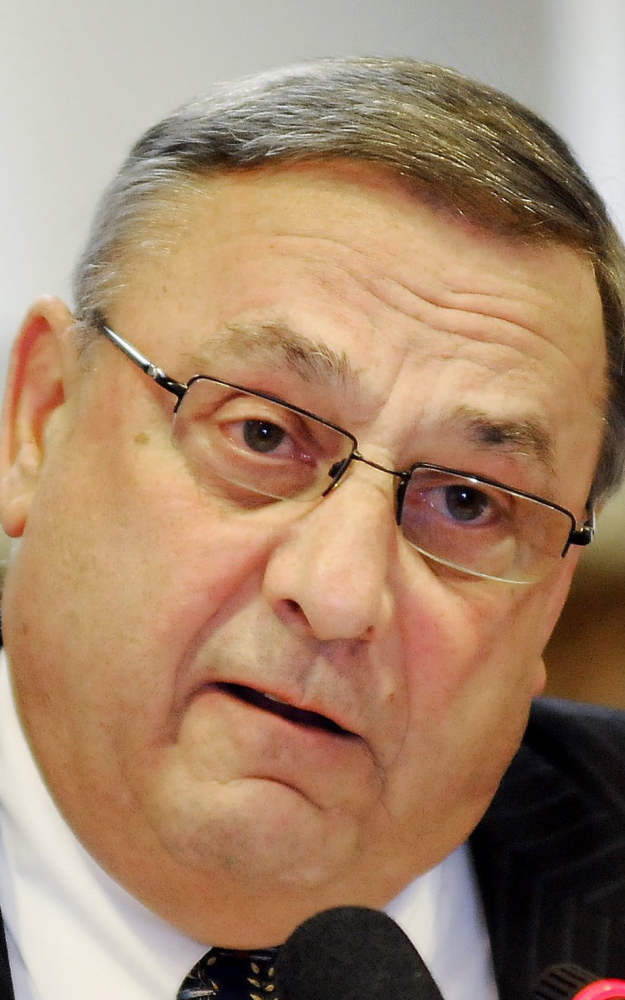AUGUSTA — Gov. Paul LePage repeated his demands for funding a voter- approved Medicaid expansion in a forceful letter to legislative leaders Monday, emphasizing that the estimated $60 million a year cost be paid for without any tax increases.
“The Legislature must now step up and identify a way to fund this, and it is your duty to the people of Maine to identify a way to pay for expansion that is both fiscally prudent and sustainable,” LePage wrote in the three-page letter, sent to both Republican and Democratic leaders in the Maine Senate and House of Representatives.
The Legislature’s budget-writing Appropriations Committee is expected to discuss expansion costs and draft questions for the Maine Department of Health and Human Services, which would oversee the expansion, when it meets on Wednesday.
Voters approved the expansion with 59 percent support in a state referendum Nov. 7. The expansion would make MaineCare health care benefits available to about 80,000 people earning less than 138 percent of the federal poverty level, or about $17,000 a year for a single adult and $22,412 for a two-person household.
The state’s commitment of about $60 million a year would draw down an estimated $525 million a year in federal matching funds under the Affordable Care Act.
LePage told the Associated Press last week that he was looking for ways to cut state spending to pay for expansion, but it was “a big reach.” He said the state can’t expand Medicaid until it has the money for the first year of its costs “in the bank.”
Speaker of the House Sara Gideon, D-Freeport, said Monday that Democrats were united and noted that LePage has vetoed expansion legislation five times in the past five years.
“The assertions of a man who is living in a taxpayer-funded mansion with taxpayer-funded health insurance saying, ‘You can’t get health insurance to a family of four who makes $24,000 a year unless you do x, y or z.’ That’s just – unconscionable really,” Gideon said.
Gideon added that the influx of federal funds that comes with Medicaid expansion would help some of Maine’s financially struggling rural hospitals, which are also often the largest employers in a region.
Gideon also noted that the $60 million estimate of the state’s cost is based on expanding the system to 80,000 newly eligible enrollees, but it would take more than a single year for that to occur. The estimate of the state’s cost is also based on a 90 percent federal reimbursement rate, which starts in 2020. Before then, states receive reimbursement rates of 95 percent in 2017, 94 percent in 2018 and 93 percent in 2019. So the cost to the state in those years could be lower, Gideon said.
She said those newly eligible would not be allowed to start enrolling until August, which means most of the costs for expansion would need to be in the budget for the state’s next two-year budget. That budget must be approved by June 30 of 2019, after LePage’s successor takes office in January 2019.
On the Republican side, some lawmakers have at least hinted at paying for expansion by cutting funds for K-12 education. The Legislature boosted education funding by $162 million in the current two-year state budget. That additional funding was provided after the Legislature repealed a law approved by voters in 2016 that added a 3 percent tax charge on household income above $200,000 to fund education.
Senate President Mike Thibodeau, R-Winterport, could not immediately be reached for comment Monday.
But the day after voters passed the Medicaid expansion question, Thibodeau said paying for it would have to be done without raiding funds from public schools.
“The results of last night’s election are clear,” Thibodeau said at the time. “It is now the job of the Legislature to once again find a path forward and to do so without raising taxes, hurting Maine’s economy, cutting services to our most vulnerable citizens, or reducing our commitment to K-12 education.”
House Minority Leader Ken Fredette, D-Newport, referred Monday to a statement he issued after the Nov. 7 election.
“I acknowledge the passing of the referendum dealing with the expansion of Medicaid,” Fredette said then. “However, I do not believe House Republicans will support any tax increase or the raiding of the rainy day fund to pay for an ever-expanding state government due to the out of control referendum process.”
Sen. Troy Jackson, D-Allagash, the Senate minority leader, said the state’s constitution does not give LePage the authority to set conditions on the Legislature’s budgeting powers.
“Democrats are committed to following the normal, deliberative appropriations process to fund this law and provide health care to 80,000 Mainers,” Jackson said. “I’d also note the voter-approved Medicaid expansion law gives Gov. LePage several deadlines for implementation – deadlines he must meet regardless of how the Legislature funds expansion. I hope he’s spending as much energy meeting his obligation under the law as he is sending letters to the Legislature.”
In his letter, LePage insisted that funding expansion require no tax increases, no use of the state’s rainy day fund and no use of other one-time funding mechanisms or “budget gimmicks.” He also called for full funding of home and community-based services for elderly and disabled residents and no reductions in funding for other populations now receiving state-funded health care benefits.
In addition, the governor wants lawmakers to cover the state’s debt to the federal government following Riverview Psychiatric Center’s decertification by the federal Department of Health and Human Services, a tab of about $60 million.
“Let me be clear,” LePage wrote. “I believe it is both contradictory and disingenuous for Democrats, the hospitals, the advocacy groups, and the wealthy out-of-state special interests who campaigned for this bill to claim that adding 80,000 people to an entitlement program will save money, but maybe it’s time to take them at their word.”
Scott Thistle can be contacted at:
sthistle@pressherald.com
Send questions/comments to the editors.



